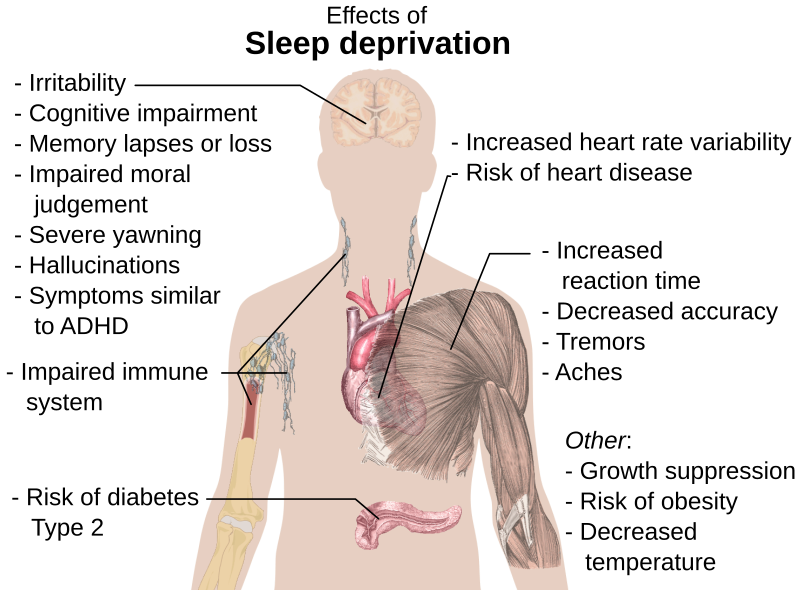Breaking the Snoring Cycle
Slumber deprivation is pretty common these days—information technology's a major attribute of accomplishment-oriented societies—simply why would anyone take a love-hate relationship with it? Usually, one would say,sleep deprivation and all the accompanying symptomsare the definition of a dearest-detest human relationship, to the cadre.
Let me tell you something: yous canuse sleep deprivation for your own benefit. Nosotros'll get into how this works, just commencement, allow's discuss the phenomenon of sleep, sleep deprivation and its symptoms, and finally blueprint a "how to" experiment nearly slumber deprivation(usually known as self-torture), and ask ourselves, more chiefly, why?
Sleep: Functionality
"Sleep is a naturally recurring country characterized by reduced or absent consciousness, […] and inactivity of most all voluntary muscles." (Macmillan, 1981). This is a curt and clear caption:
- sleep is characterized by sleep stages/cycles (five cycles, differing in depth)
- the deeper your sleep, the better the quality of sleep
- More Slumber ≠ Better (healthy avg. 7.five-9 hours)
The functions of sleep are very multifaceted and majorly unexplored, just these (validated, and commonly accustomed) aspects interest us the most right now. Sleep has a major impact:
- on our memory and the ability to re-organize thoughts, experiences and to larn new things (neuroplasticity)
- on the regulation of necessary hormones and the ability of our body to regenerate physically
What is Sleep Deprivation?
Sleep deprivation is the lack of slumber: either it was caused by a very superficial and short sleep (over a period of some days) or by no sleep at all. The functionality and benefits of sleep are limited every bit a result (encounter above), and we might face someserious bug, if nosotros stay sleep-deprived for a prolonged period of time.
The effects of sleep impecuniousness are diverse; some occur instantly afteracute impecuniousness, other occur only afterchronic impecuniousness:

(by Mikael Häggström, Wikimedia Commons, 2009)
After acute deprivation:
- irritability
- cerebral impairment
- memory lapses
- restricted judgement
- astringent yawning
- increased centre-charge per unit variability, increased reaction time and decreased accuracy
- temporary emotional instability
Subsequently chronic deprivation:
The effects of chronic deprivation boil downward to the development of diverse diseases, such every bit:
- Diabetes
- center affliction
- growth suppression
- restricted immune system functionality
- weight gain/loss
- low
Due to the diversity of acute deficits, sleep deprivation has been used as a successful interrogation technique. In fact, the U.S. military authorised slumber deprivation as an interrogation method (Leave no Marks: Enhanced Interrogation Techniques and the Risk of Criminality, August 2007).
But hey, why would in that location exist adearest-hate human relationship here? What'due south the benefit for the states?!
How To (..and the benefits of slumber deprivation?!)
The effects of slumber deprivation on the man trunk were observed and analyzed in the 70s: the methodological monitoring involved claret assay, just too neuropsychological instruments to capture the brain action during sleep-impecuniousness and duringrecovery slumber after deprivation.
The results:"There's show of antidepressive effect after sleep deprivation."As a matter of fact, subjects experienced a37.2 % comeback in their mood!
The background of these results are diverse—the reasons behind the remarkable mood improvement are, amid others:
- biochemical investigations proved an increase of dissimilar hormones, including serotonin and noradrenaline, which are too known to functionas a happiness hormone (serotonin) and stimulating hormone (noradrenaline)
- improved sleep continuity and depth in the night after sleep deprivation
These mentioned effects have activity in depressedmerely too non-depressed people,meaning that you can stay awake for a night, begin the next solar day as y'all usually do and try to keep yourself awake (that's not very easy!) and go to bed quite early → sleep like a baby → wake up the next morning withmore power and energy.
By depriving yourself of sleep, youprepare your biological clock to null— in case your time management is messed up and running out of fuel, this can very helpful (a love-detest relationship). Yous can phone call sleep deprivationslumberhacking: at first we abstain from slumber, and after (during the recovery nighttime) we slip into a very deep country of sleep, which volition regenerate usa.
Admittedly, sleep deprivation amongst good for you people is ofttimes met with skepticism, mainly considering salubrious subjects can regulate their sleep pattern in other means (through nutrition, sleep hygiene and sleep rituals). On the other hand, sleep impecuniousness is free of whatsoever serious side effects and tin serve as a quick set up. Here's a short how-to:
- Perform your sleep deprivation "experiment" on the weekend (working in a sleep deprived state can be hard)
- Go on yourself awake during your sleep impecuniousness night (and the following mean solar day) with the help of tea or coffee, but please don't overdo it
- Become to bed early on your sleep-deprived day, and enjoy your deep recovery dark (7.5 – 9 hours)
- Wake up powerful and energized, feeling like a meg dollars
After your slumber deprivation experiment you should take intendance of a well-balanced diet and good sleeping habits—do not backslide to old, negative tendencies. Slumber deprivation for a nighttime can be practical easily, is highly constructive and free of serious side effects. Have you already tried it? Share your experience with u.s.!
Featured photo credit: Lux Graves via unsplash.com
Source: https://www.lifehack.org/523940/breaking-the-snoring-cycle
0 Response to "Breaking the Snoring Cycle"
Post a Comment